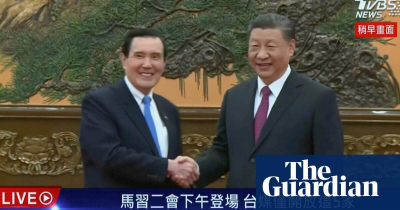The Guardian-China and Taiwan are destined for reunification Xi tells former president
April 10, 2024 3 min 572 words
这篇报道揭示了习近平与前台湾总统马英九的会面,以及习近平对于中台“统一”的强烈信念。然而,这并非一个单方面的问题,我们必须考虑台湾人民的意愿。近年来,越来越多的台湾人民和台湾政府反对成为中国的一部分,这是一个不容忽视的事实。马英九虽然是国民党最亲中的人物,但国民党也反对统一,只是主张与中国保持更紧密的关系以维护和平。此外,北京试图通过友好的面孔和破坏台湾现政府来推动统一的努力,可能会引发更多的反感,而不是接受。台湾人民的身份认同正在发生变化,他们越来越视自己为台湾人,而非中国人。对于习近平的“统一”信念,我们必须保持警惕,因为这可能会引发更大的冲突和分歧,而不是和平与团结。
Xi Jinping has met the former Taiwan president Ma Ying-jeou, in what analysts said was an attempt to promote peaceful unification as the only alternative to military annexation of Taiwan.
Ma, who was leading a student delegation to China, met Xi in Beijing at the Great Hall of the People, a venue typically reserved for foreign leaders meeting with senior Chinese officials. Xi used the meeting to emphasise his belief that Taiwan and China were destined for what he terms “reunification”.
“External interference cannot stop the historical trend of reunion of the country and family,” Xi said, according to Taiwanese media. He said that people on both sides of the Taiwan strait were Chinese, and “there is no rancour that cannot be resolved, no problem that cannot be discussed, and no force that can separate us”.
According to local reports, Ma said that a war between the two sides would be “an unbearable burden for the Chinese nation”.
“The Chinese people on both sides of the Taiwan Strait will definitely have enough wisdom to handle cross-strait disputes peacefully and avoid conflicts,” Ma said.
Xi claims Taiwan as a province of China and has sworn to annex it, by force if necessary. In the interim he has presided over a wide-scale campaign of political, economic and cognitive warfare, and near-daily military intimidation, in order to persuade Taiwan to accept Chinese rule.
However a growing majority of Taiwan’s people and its government reject the prospect. The Kuomintang (KMT) opposition party, of which Ma remains a senior member, also rejects reunification but advocates for closer ties with China as the way to preserve peace. Ma is one of the party’s most China-friendly figures.
Amanda Hsiao, a senior China analyst with the International Crisis Group, said Beijing was trying to put on a friendlier face but also probably trying to undermine the ruling party and incoming government, just weeks out from the presidential inauguration of Lai Ching-te, whom Beijing despises. At the same time it was attempting to give the KMT “more material to say that only they can lower cross-strait tensions”.
“While parts of the messages conveyed during the meeting will appeal, other aspects [like] that the two sides are parts of a great Chinese nation will likely have limited appeal to a larger society which increasing identifies as distinctly Taiwanese,” Hsiao said.
Ma left office eight years ago but still holds some social and political influence, and has remained a visible public figure. On Wednesday, Xi praised Ma’s promotion of cross-strait exchanges and opposition to Taiwanese independence.
Wen-Ti Sung, a political expert at the Australian National University, said Ma was probably trying to preserve his legacy of warmer ties with China. Sung said Beijing’s “continued fixation” on Ma could suggest an inability to cultivate other senior political figures in Taiwan who were “willing to play dove towards Beijing today”.
However, Beijing was also likely to be using the visit to signal that peaceful unification through “winning over hearts and minds” remained Beijing’s preferred option, he said.
Wednesday’s meeting had been rumoured but was not confirmed until shortly before. It was the second for Xi and Ma, after a landmark summit in Singapore in 2015, while Ma was still president. No current leader of Taiwan has visited China since the end of the civil war in 1949.
Additional reporting by Chi Hui Lin

